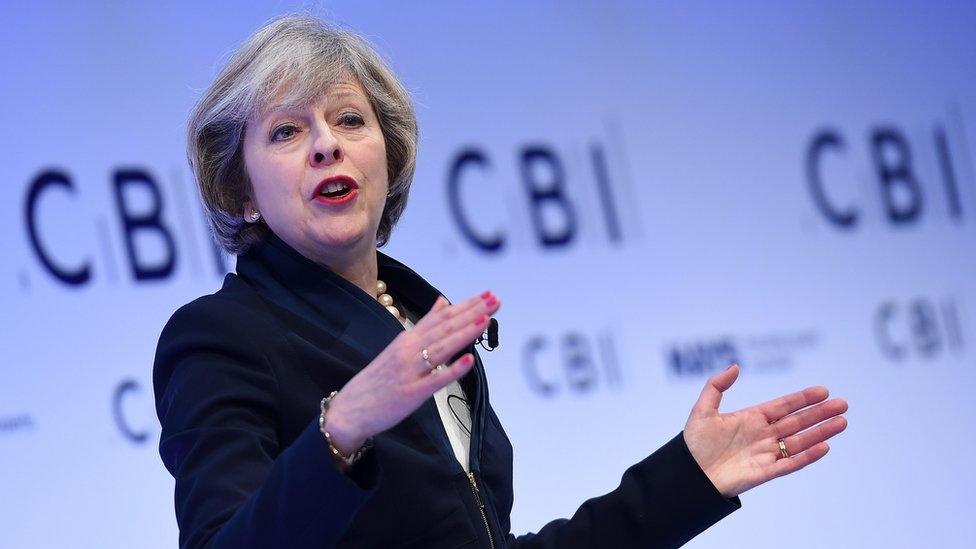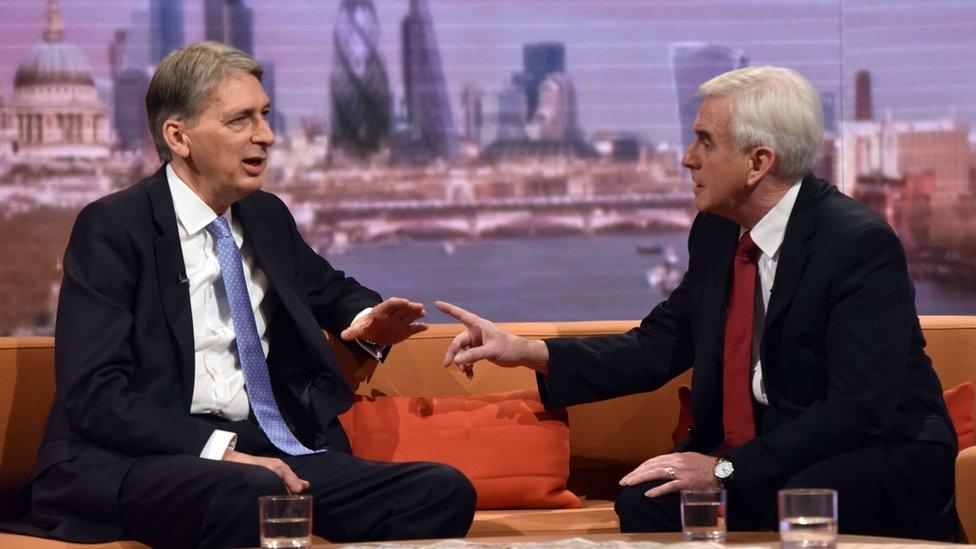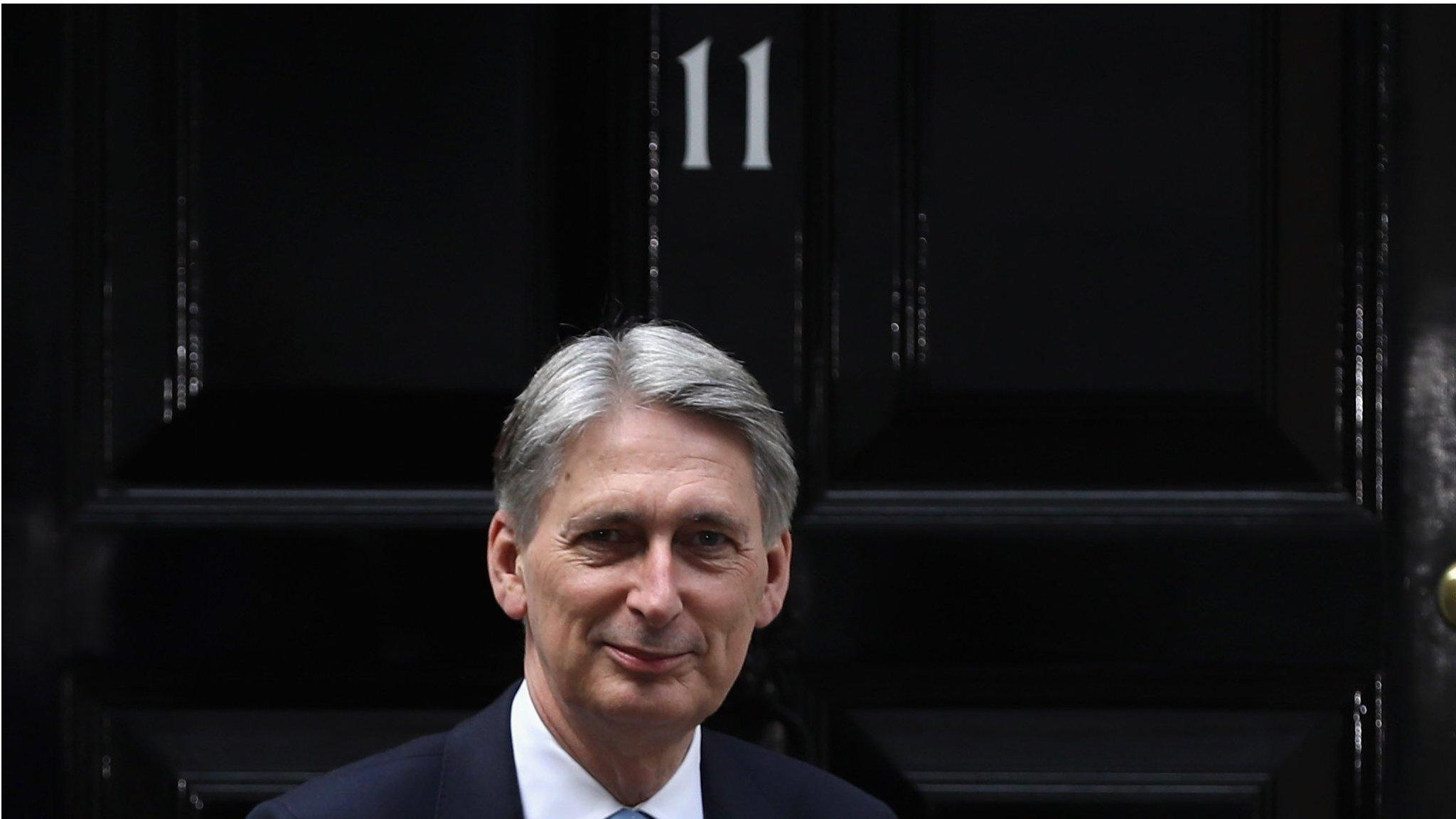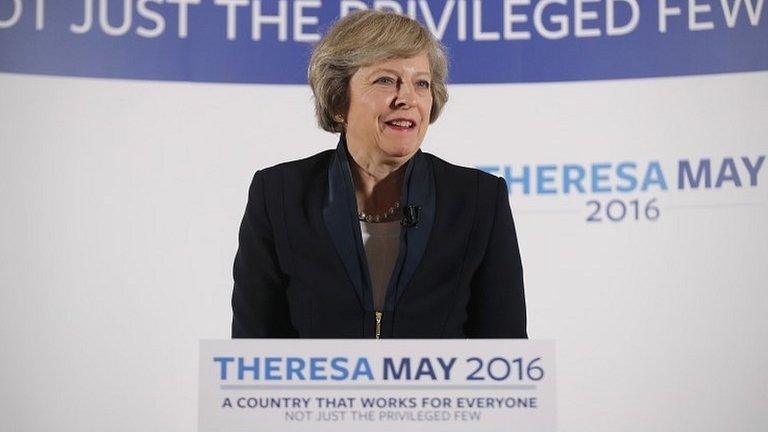Theresa May bids to reassure business on Brexit 'cliff-edge'
- Published
- comments
Theresa May on her Brexit plans - and workers on boards
Theresa May has tried to reassure businesses fearing a sudden change in rules once the UK leaves the EU.
Speaking at the CBI conference, Mrs May promised early agreement on the status of UK nationals in Europe and EU nationals in the UK.
"People don't want a cliff-edge; they want to know with some certainty how things are going to go," she said.
Several business lobby groups have pushed for an interim deal to let them trade in the same way post-Brexit.
Mrs May said she understood companies' concerns and was "conscious that there will be issues that will need to be looked at".
"That will be part of the work that we do in terms of the negotiation that we are undertaking with the European Union," she added.
She also pledged to provide clarity on the government's plans where possible, but said there would not be "a running commentary on every twist and turn".
Downing Street declined to say whether Mrs May's comments about avoiding a "cliff-edge" meant she was seeking a transitional deal to cover the period between the UK's departure from the EU and the start of a new trade deal.
"She was reflecting the views we have expressed already about how we secure the best deal for the UK and how we seek to provide certainty where we can to businesses and people across the UK of the steps moving forward," the PM's official spokeswoman said.
In the wide-ranging speech, Mrs May also pledged to:
Invest £2bn annually in research and development by 2020
Launch an Industrial Strategy aimed at spreading economic growth across the UK
Examine how innovative firms can get long-term investment with a "Patient Capital Review"
Launch a small business research initiative looking at how more innovators can get their first break
Consult on plans to reform corporate governance, including executive pay and accountability to shareholders
Deliver the "lowest corporation rate in the G20"
Workers on boards?
The prime minister also insisted she still favoured worker representation on company boards, dismissing suggestions that comments she made during the speech marked a watering-down of the idea.
There have been widespread reports since the summer that Mrs May wanted to see workers on boards as part of a corporate governance shake-up, an idea that had caused unease among companies and, according to the Financial Times, disagreements in Cabinet.
However, the prime minister told the CBI that there were "other routes" to providing worker representation on boards, including advisory councils or panels.
"It will be a question of finding the model that works," she said.
Mrs May promised to shake-up governance as part of her Conservative Party leadership campaign in July, and repeated the promise at last month's party conference when she said she planned to have "not just consumers represented on company boards, but workers as well".
And later, on Sky News, when asked if her conference speech marked a watering down of the idea, Mrs May said. "No, what I've always said is that we want to look at ways in which we can improve corporate governance, looking at a number of areas, including workers' representation on boards. You can do that in a number of ways.
"We want to work with business on this and that's why we'll be consulting later this year on the various ways in which we can do it to find a model that works," she said.

Analysis: Simon Jack, Business editor
Did the PM arrive at the CBI conference with an olive branch or just another stick? A little bit of both.
Business groups have been wary of Theresa May ever since her blistering attack on the massive pay differentials, tax avoidance and treatment of workers she identified in some corners of British business.
Today, she offered a more conciliatory tone. As well as weakening her commitment to put workers on company boards, saying only their voice should be represented - she insisted her agenda was unequivocally pro-business.
However, there was no escaping the big question as spelled out by the CBI's President, Paul Dreschler: "What happens the day after we leave the EU? Government has a responsibility to keep uncertainty to a minimum. We understand, in negotiations, the need for discretion, we're not asking for a running commentary but we are looking for clarity and above all a plan."
Business folk were pleased to hear her say, when questioned, that she understood their fears over a potential cliff edge of trading and regulatory uncertainty the day after Britain leaves the EU but weren't so pleased she declined to reassure them with details of her plan.
If business leaders were hoping to be treated to the same fireside chat that seemed to comfort the boss of Nissan, they would have left disappointed.
£2bn of new money for research and development was welcomed and business leaders seemed to accept the essential premise of the grand bargain she is offering - the government invests to boost productivity and cut corporation tax in exchange for help in tackling the worst excesses of capitalism.

'Clear promise'
However, trade unions said they were disappointed by Mrs May's remarks.
TUC general secretary Frances O'Grady said: "Theresa May made a clear promise to have workers represented on company boards. The proposals in her speech do not deliver on this.
"This is not the way to show that you want to govern for ordinary working people."
Carolyn Fairbairn tells The World At One there are other options for worker representation
But CBI director-general Carolyn Fairbairn said "different approaches will work for different businesses" on employee engagement.
"A starting point is firms being able to outline and explain what approach they are taking - whether that's employees on boards, employee committees, dedicated representatives, or other models that genuinely address the issue."
What May did and didn't say at CBI
Financial upheaval ahead for families
Mrs May also promised to boost productivity and cut corporation tax in exchange for help from businesses in tackling issues such as executive pay and shareholder accountability.
"Just as the government must open its mind to a new approach, so the business community must too," she said.
The promises made by the prime minister include a "patient capital review" to help firms secure long-term investment. The review will be chaired by Sir Damon Buffini, the former head of private equity group Permira.
Mrs May also said the government would review the support given to innovative firms through the tax system "because my aim is not simply for the UK to have the lowest corporate tax rate in the G20, but also one that is profoundly pro-innovation."
Corporation tax is already due to fall from its current 20% rate to 17% by 2020.
Labour leader Jeremy Corbyn addressed the conference later in the day criticising the government's "shambolic" approach to Brexit which he said was hampering business's ability to plan. He set out Labour's approach to working with business, which he said would be characterised by "good intervention".
He said Labour's policies would involve "some increase in corporation tax" and said the suggestion that the UK should aim to reduce corporation tax to 15% or below was "reckless short-term grandstanding."
He called for more investment in housing, research and development and infrastructure, a higher minimum wage and measures to prevent undercutting of workers' pay and conditions.
- Published21 November 2016

- Published20 November 2016

- Published16 November 2016

- Published27 October 2016

- Published11 July 2016
